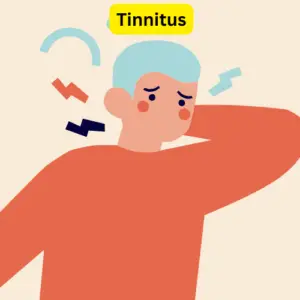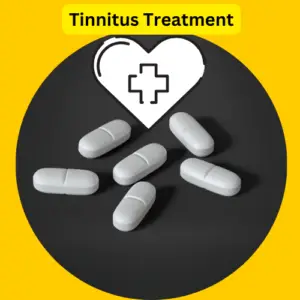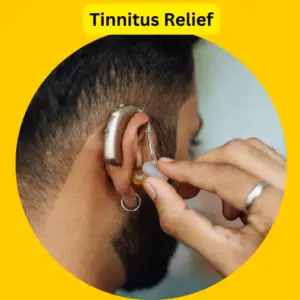Understanding Tinnitus, That persistent phantom symphony playing behind the curtain of your ears. It can whisper like a faint breeze or roar like a raging waterfall, a constant companion that disrupts your focus and steals your peace. If you’re one of the millions living with tinnitus, you know the frustration and isolation it can bring. But here’s the good news: you’re not alone, and there is hope.

Understanding the Spectrum: Pulsatile Tinnitus
Not all tinnitus is created equal. While the classic ringing or buzzing in the ears is the most common form, pulsatile tinnitus stands apart. This rhythmic throbbing or thumping, often in sync with your heartbeat, can be a symptom of underlying medical conditions like high blood pressure. Recognizing the distinction is crucial for seeking the right type of help.
Chapter 1: What is Tinnitus? Understanding Tinnitus.

2.1 Definition and Manifestations:
Tinnitus, simply put, is the perception of sound in the absence of any external source. It’s like having your orchestra performing inside your head, playing only for you. The sounds can be diverse, ranging from buzzing and ringing to hissing and roaring. It can be constant or intermittent, affecting one or both ears.
2.2 The Varied Nature of Tinnitus Sounds:
The spectrum of tinnitus sounds is as varied as the individuals who experience it. For some, it’s a constant high-pitched ringing, while others describe it as a low hum or a roaring ocean. Some even hear music or phantom conversations. Recognizing your specific sound can help you find targeted treatment options.
2.3 Impact on Daily Life:
Tinnitus can significantly impact your quality of life. It can disrupt sleep, hinder concentration, and make it difficult to focus on conversations. The constant awareness of the sound can lead to anxiety and depression, creating a vicious cycle that feeds the tinnitus itself.
Chapter 2: Tinnitus Causes
Understanding the underlying causes of your tinnitus is key to finding relief. Some common culprits include:

3.1 Noise-Induced Hearing Loss:
Loud noises, from concerts to occupational hazards, can damage the delicate hair cells in your inner ear, leading to hearing loss and tinnitus.
3.2 Age-Related Hearing Loss:
As we age, our hearing naturally declines. This age-related hearing loss can also contribute to tinnitus.
3.3 Earwax Blockage and Tinnitus:
While not a direct cause, a buildup of earwax can sometimes worsen tinnitus symptoms by impacting sound transmission.
3.4 Tinnitus and Hearing Aid Connection:
Interestingly, hearing loss and tinnitus often go hand-in-hand. In many cases, addressing hearing loss with hearing aids can significantly reduce tinnitus symptoms by amplifying external sounds and taking the focus away from the phantom noise.
Chapter 3: Tinnitus Treatment

While there’s no one-size-fits-all cure for tinnitus, numerous treatment options can help manage the symptoms and improve your quality of life:
4.1 Conventional Approaches:
4.1.1 Medications for Tinnitus:
While no medications directly cure tinnitus, certain medications can address underlying conditions like anxiety or sleep disturbances that can exacerbate the symptoms.
4.1.2 Sound Therapy:
White noise, nature sounds, or calming music can mask the tinnitus tones, providing relief and helping you focus on external sounds.
4.2 The Role of Cognitive Behavioral Therapy (CBT):
CBT teaches you coping mechanisms to manage stress and anxiety associated with tinnitus, leading to symptom improvement and emotional well-being.
4.3 Hearing Aids as a Promising Solution:
For many people with tinnitus, hearing aids are a game-changer. By amplifying external sounds, they mask the tinnitus and improve overall hearing, leading to a significant reduction in perceived tinnitus loudness.
Chapter 4: Tinnitus Relief Through Hearing Aids

5.1 How Hearing Aids Work for Tinnitus: Understanding Tinnitus
Imagine your brain as a conductor trying to harmonize all the incoming sensory information. When you have hearing loss, some instruments in the orchestra go silent. This throws the whole performance off, and your brain compensates by amplifying the remaining sounds, including the phantom tones of tinnitus. Hearing aids act as amplifiers, gently bringing those silent instruments back into the mix. By filling in the gaps in your hearing, the brain has less to compensate for, and the tinnitus often fades into the background.
5.2 Types of Hearing Aids Suited for Tinnitus Relief:
Not all hearing aids are created equal when it comes to tinnitus. Modern hearing aids often come equipped with built-in tinnitus sound generators and advanced features like directional microphones and noise cancellation. These features can further mask the tinnitus while allowing you to hear clearly in challenging environments.
5.3 Customization Features for Personalized Relief:
The beauty of modern hearing aids lies in their personalized approach. Audiologists can fine-tune the settings to match your specific hearing loss profile and tinnitus frequency. This ensures optimal sound amplification and tinnitus masking, creating a comfortable and effective listening experience.
5.4 Real-life Success Stories:
Hearing the positive experiences of others can be a powerful source of hope and motivation. Include brief anecdotes or testimonials from individuals who have found significant relief through hearing aids, highlighting the improvement in their daily lives and overall well-being.
Chapter 5: Tinnitus Cure – Myth or Possibility?
6.1 Dispelling Myths Surrounding Tinnitus Cures:
Unfortunately, a magic pill for tinnitus remains elusive. There are numerous myths and scams around miracle cures, often preying on the desperation of those seeking relief. It’s crucial to stay informed and skeptical of such claims, focusing on evidence-based approaches and working with reputable healthcare professionals.
6.2 The Realistic Approach: Managing and Alleviating Symptoms:
While a complete cure might not be available yet, the good news is that tinnitus can be effectively managed. By combining various treatment options like hearing aids, sound therapy, and CBT, you can significantly reduce the impact of tinnitus on your life and rediscover peace and joy.
Chapter 6: COVID Vaccines and Understanding Tinnitus
7.1 Addressing Concerns and Clarifying Misconceptions:
With the widespread rollout of COVID-19 vaccines, concerns about a potential link to tinnitus have emerged. It’s essential to address these concerns with factual information and dispel any misinformation. While some isolated cases of tinnitus after vaccination have been reported, research evidence suggests they are statistically rare and often resolve on their own.
7.2 Research Insights on COVID Vaccines and Tinnitus:
Large-scale studies have found no definitive association between COVID-19 vaccines and tinnitus development. The reported cases could be due to other factors or underlying conditions already present. It’s crucial to weigh the well-documented benefits of vaccination against the extremely low risk of potential tinnitus, emphasizing the importance of protecting yourself and others from the virus.
Chapter 7: What Causes Tinnitus – Unraveling the Mystery
8.1 Exploring the Multifactorial Nature of Tinnitus:
The exact cause of tinnitus remains a complex puzzle. It’s often the result of a combination of factors, including noise exposure, hearing loss, ear infections, and even certain medications. In some cases, it can be linked to neurological conditions or temporomandibular joint (TMJ) dysfunction. Understanding the potential contributing factors can help guide treatment decisions and tailor a personalized approach.
8.2 The Role of Neural Hyperactivity:
Recent research suggests that neural hyperactivity in the auditory cortex, the brain region responsible for processing sound, might play a role in tinnitus development. This increased activity, even in the absence of external stimuli, can manifest as the phantom sounds we hear. Understanding this mechanism opens doors for potential future therapies aimed at modulating brain activity and alleviating tinnitus symptoms.
8.3 Understanding Vascular Causes:
In some cases, pulsatile tinnitus can be caused by vascular issues, such as high blood pressure or abnormal blood flow near the ear. Identifying the underlying vascular cause is crucial for addressing the tinnitus effectively and ensuring overall health and well-being.
Living with tinnitus doesn’t have to be a life sentence of isolation and struggle. With knowledge, informed decisions, and access to the right treatment options, you can regain control and significantly improve your quality of life. Remember, you’re not alone in this journey. Support groups, healthcare professionals, and advances in research and technology are all dedicated to finding solutions and offering hope for a future free from the constant buzz and roar.
Remember, I’m here to help you every step of the way. Feel free to ask any further questions or request additional information as you refine your blog post. Let’s work together to create a valuable resource that makes a real difference in the lives of those affected by tinnitus.
Frequently Asked Questions About Tinnitus:
Q.1 What is tinnitus?
Tinnitus is the perception of sound in the absence of any external source. It can sound like ringing, buzzing, hissing, roaring, or even music or voices. It can be constant or intermittent, affect one ear or both, and vary in intensity.
Q.2 How common is tinnitus?
Tinnitus is very common, affecting around 15-20% of adults globally. It can occur at any age but is more prevalent in older adults and people with hearing loss.
Q.3 What causes tinnitus?
Tinnitus can be caused by a variety of factors, including:
- Noise exposure: Loud noises, especially prolonged exposure, can damage the hair cells in your inner ear, leading to tinnitus.
- Hearing loss: Age-related hearing loss, ear infections, or Meniere’s disease can all contribute to tinnitus.
- Medications: Certain medications, such as aspirin and some antibiotics, can have tinnitus as a side effect.
- Head or neck injuries: Injuries to the head or neck can sometimes damage the auditory system and cause tinnitus.
- Stress and anxiety: Emotional stress can worsen tinnitus symptoms or even trigger them in some individuals.
Q.4 Is there a cure for tinnitus?
There is currently no cure for tinnitus, but many effective treatments can manage the symptoms and improve your quality of life.
Q.5 What are the treatment options for tinnitus?
Treatment options for tinnitus vary depending on the underlying cause and severity of symptoms. Some common approaches include:
- Hearing aids: If you have hearing loss, hearing aids can amplify external sounds and mask the tinnitus noise.
- Sound therapy: Listening to white noise, nature sounds, or calming music can help mask the tinnitus and provide relaxation.
- Tinnitus retraining therapy (TRT): This therapy involves training your brain to habituate to the tinnitus sound, making it less noticeable.
- Cognitive behavioral therapy (CBT): CBT can help you manage stress and anxiety associated with tinnitus, which can improve your overall well-being and reduce tinnitus symptoms.
- Lifestyle changes: Getting enough sleep, avoiding loud noises, and managing stress can all help improve your tinnitus management.
Q.6 Is tinnitus related to COVID-19?
While some isolated cases of tinnitus have been reported after COVID-19 vaccination, large-scale studies have not found a definitive link. The reported cases could be due to other factors or underlying conditions. Overall, the benefits of COVID-19 vaccination far outweigh the extremely low risk of potential tinnitus.
Q.7 Can I prevent tinnitus?
Protecting your hearing from loud noises is the best way to prevent tinnitus. This includes wearing ear protection in noisy environments, avoiding prolonged exposure to high-decibel sounds, and turning down the volume on headphones and music players.
Q.8 What are some resources for people with tinnitus?
There are many resources available to support people living with tinnitus, including:
- The American Tinnitus Association: https://www.ata.org/
- The Hearing Loss Association of America: https://www.hearingloss.org/
- The Tinnitus Talk support group: https://www.tinnitustalk.com/
Remember, you’re not alone in your experience with tinnitus. There are many resources and support systems available to help you manage your symptoms and live a fulfilling life.



1 thought on “Understanding Tinnitus: A Comprehensive Guide to Hearing Aids as Relief”